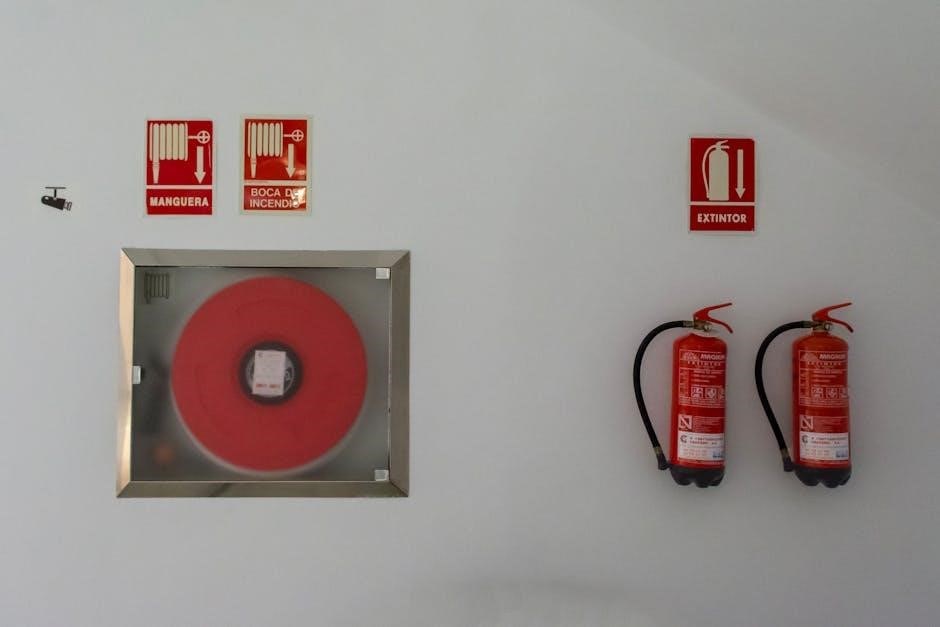Overview of Smoke Alarm Compliance in Queensland
Smoke alarm compliance is crucial for safety and legal adherence in Queensland. The QFES mandates interconnected smoke alarms in all homes, with certificates ensuring adherence to standards and deadlines, avoiding penalties.
1.1 Importance of Smoke Alarm Compliance Certificates

Smoke alarm compliance certificates are essential for verifying that a property meets Queensland’s fire safety regulations. They confirm that smoke alarms are installed, maintained, and functioning correctly, ensuring resident safety. Landlords and property managers must provide these certificates to avoid penalties and legal disputes. Compliance certificates also serve as proof for tenants, buyers, or authorities that the property adheres to QFES standards. Failure to obtain one can result in fines or property being deemed uninhabitable. These certificates are issued by licensed professionals, guaranteeing reliability and adherence to the law.
1.2 Legislative Requirements for Smoke Alarms in QLD
Queensland legislation mandates strict smoke alarm requirements to enhance fire safety. As of 31 December 2021, all rental properties must have interconnected photoelectric smoke alarms installed. These alarms must comply with Australian Standard 3786-2014 and be powered by a 10-year battery or hardwired. Landlords are legally obligated to ensure compliance, with penalties for non-adherence. The QFES enforces these standards, requiring smoke alarms in all bedrooms, hallways, and living areas. Interconnected systems are mandatory for new installations, ensuring all alarms activate simultaneously. Annual testing and maintenance are also required by law to maintain functionality and safety.
Key Requirements for Smoke Alarm Compliance
Smoke alarms in Queensland must be photoelectric, interconnected, and installed in every bedroom, hallway, and living area. Annual testing and cleaning are mandatory for compliance.
2.1 Types of Smoke Alarms Approved in Queensland
In Queensland, only photoelectric smoke alarms are mandated for residential properties, as they detect smoldering fires more effectively than ionization types. These alarms must meet Australian Standard 3786-2014. Hardwired and battery-powered smoke alarms are both acceptable, but hardwired systems are preferred for reliability. Interconnectivity is required, ensuring all alarms trigger simultaneously. Compliance certificates are issued only for installations meeting these specifications, ensuring safety and adherence to state regulations.
2.2 Positioning and Installation Standards
Smoke alarms in Queensland must be installed on ceilings, at least 300mm from corners and lights, and 400mm from air-conditioning vents. They should not be placed in bathrooms, kitchens, or areas prone to steam or smoke. Installation must follow manufacturer guidelines and Australian Standards. Alarms must be interconnected in multi-level homes, ensuring simultaneous activation. Proper positioning ensures maximum effectiveness in detecting fires early. Compliance certificates are issued only if installations meet these strict placement and installation criteria, guaranteeing safety and adherence to state fire safety regulations.
2.3 Interconnected Smoke Alarm Systems
Interconnected smoke alarm systems are mandatory in Queensland, ensuring all alarms activate simultaneously. This enhances early warning and safety. Hardwired or wireless systems must meet Australian Standards. Multi-level homes require interconnected alarms on each level. Proper installation ensures seamless communication between devices. Compliance certificates verify that systems meet QFES recommendations. Interconnected alarms are critical for effective fire detection and response, especially in larger properties. They must be tested regularly to ensure functionality. This requirement is non-negotiable for maintaining safety and meeting legislative standards in Queensland. Non-compliance can result in penalties and safety risks.

Obtaining a Smoke Alarm Compliance Certificate
A smoke alarm compliance certificate in QLD is obtained after a licensed professional inspects and verifies that smoke alarms meet legislative requirements and standards.

3.1 Who Can Issue a Compliance Certificate in QLD
In Queensland, smoke alarm compliance certificates can only be issued by licensed professionals, such as electricians or fire safety experts. These individuals must have the necessary qualifications to inspect and verify that smoke alarms meet the required standards. The certificate confirms that the smoke alarms are correctly installed, functional, and compliant with QLD legislation. This ensures safety and legal adherence, particularly for rental properties and home sales. Proper licensing and certification are critical to avoid penalties and ensure reliability.
3.2 Steps to Ensure Compliance and Certification
To ensure smoke alarm compliance in Queensland, property owners must follow specific steps. First, install smoke alarms that meet Australian Standard 3786-2014, typically photoelectric alarms. Ensure alarms are interconnected, especially in multi-story homes. Hire a licensed electrician or fire safety professional for installation and inspection. Conduct regular testing and cleaning of alarms to maintain functionality. Keep detailed records of maintenance activities. Finally, obtain a compliance certificate from the installer, which confirms adherence to QLD legislation. Failure to comply can result in penalties, emphasizing the importance of thorough preparation and documentation.
Maintenance and Testing of Smoke Alarms
Regular testing and maintenance of smoke alarms are essential for ensuring reliability and compliance in Queensland properties. Testing should occur monthly, with professional checks annually.
4.1 Frequency of Testing and Cleaning
Smoke alarms in Queensland must be tested monthly by pressing the test button to ensure functionality. Professional inspection and cleaning are recommended annually to maintain reliability. Homeowners should clean dust and debris from alarms regularly to prevent false activations. Battery-powered units require annual battery replacement, while hardwired systems need professional checks. Documentation of maintenance activities is crucial for compliance certificates. Failure to adhere to these standards can result in non-compliance penalties. Regular maintenance ensures smoke alarms operate effectively, providing critical early warning in case of fire. Proper upkeep is vital for tenant and property safety under Queensland legislation.
4.2 Documentation of Maintenance Activities
Accurate documentation of smoke alarm maintenance is essential for compliance. Records must include dates of testing, cleaning, battery replacements, and any repairs. Landlords and property managers should store these documents securely, as they may be required during audits or inspections. Tenants should also maintain records of their own testing activities. Proper documentation ensures accountability and verifies adherence to Queensland’s smoke alarm legislation. It also serves as proof of compliance for certification purposes. Keeping detailed records helps avoid penalties and demonstrates commitment to fire safety standards. Regular updates and secure storage are vital for legal and safety reasons.
Consequences of Non-Compliance
Non-compliance with smoke alarm regulations in Queensland can lead to significant penalties, legal action, and rental property issues, emphasizing the importance of adhering to safety standards.
5.1 Penalties for Non-Compliant Smoke Alarms
Property owners in Queensland face substantial penalties for non-compliant smoke alarms, including fines and legal actions. The QFES enforces strict regulations, with penalties escalating for repeated offenses. Non-compliance can result in financial losses and legal repercussions, particularly for rental properties. Landlords must ensure all smoke alarms meet current standards to avoid these consequences. Compliance is non-negotiable, and failure to adhere can lead to severe financial penalties and potential legal battles. Proper installation and maintenance are critical to avoid these outcomes.

5.2 Impact on Rental Properties and Tenancies
Non-compliant smoke alarms significantly impact rental properties and tenancies in Queensland. Landlords must ensure properties meet smoke alarm standards to avoid penalties and maintain legal renting rights. Tenants may face unsafe living conditions if alarms are non-compliant, leading to potential disputes. Failure to comply can result in fines and legal actions against property owners, jeopardizing rental agreements. Proper compliance ensures tenant safety and avoids conflicts, making it essential for landlords to prioritize smoke alarm maintenance and certification to uphold their obligations and protect their investments.

Resources and Support
- Visit QFES website for comprehensive guidelines and publications.
- Contact QFES via email at SmokeAlarms@qfes.qld.gov.au for further assistance.
- Download the “Wake Up to Photoelectric Smoke Alarms” guide for detailed information.
6.1 QFES Guidelines and Publications
The Queensland Fire and Emergency Services (QFES) provides detailed guidelines and publications to assist with smoke alarm compliance. These resources, available on the QFES website, include fact sheets, checklists, and FAQs to ensure adherence to legislation. Key documents such as the “Wake Up to Photoelectric Smoke Alarms” brochure and the Smoke Alarm Compliance Checklist are essential tools. These publications outline the requirements for installation, maintenance, and certification, helping property owners and managers meet legal standards effectively.
- Access the QFES Smoke Alarms page for downloadable resources.
- Review the “Smoke Alarm Compliance Checklist” for step-by-step guidance.
- Email SmokeAlarms@qfes.qld.gov.au for personalized support.
These resources are designed to simplify compliance and ensure the safety of all occupants in Queensland properties.

6.2 Contact Information for Further Assistance
For assistance with smoke alarm compliance, contact the Queensland Fire and Emergency Services (QFES) directly. Visit their official website at www.qfes.qld.gov.au or email SmokeAlarms@qfes.qld.gov.au. Phone inquiries can be directed to 13 QFES (13 73 78). Additional support is available through the QFES Smoke Alarm Compliance Checklist and the “Wake Up to Photoelectric Smoke Alarms” brochure, ensuring comprehensive guidance for property owners and managers in Queensland.



About the author